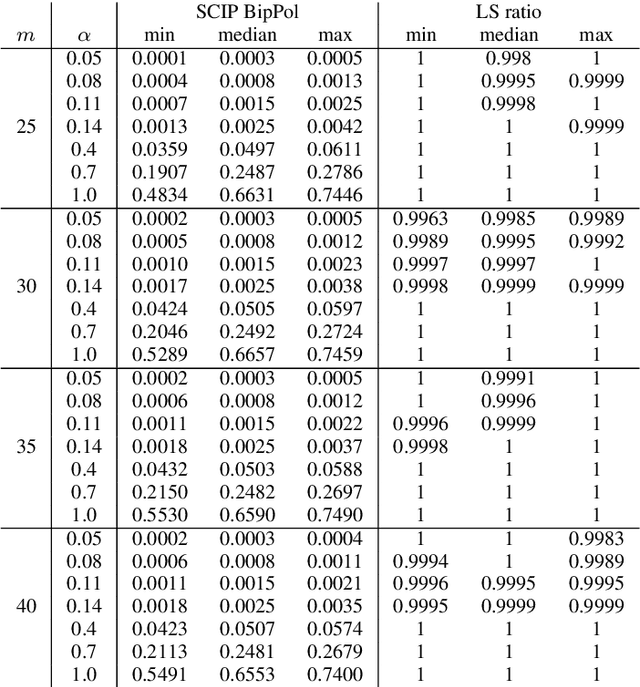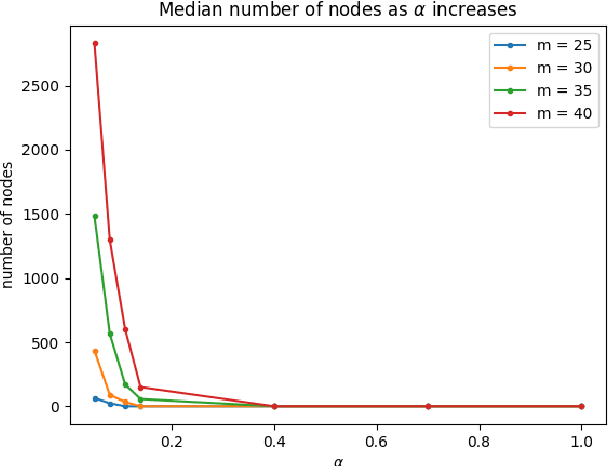Teresa Alsinet
On the Complexity of the Bipartite Polarization Problem: from Neutral to Highly Polarized Discussions
Jul 21, 2023


Abstract:The Bipartite Polarization Problem is an optimization problem where the goal is to find the highest polarized bipartition on a weighted and labelled graph that represents a debate developed through some social network, where nodes represent user's opinions and edges agreement or disagreement between users. This problem can be seen as a generalization of the maxcut problem, and in previous work approximate solutions and exact solutions have been obtained for real instances obtained from Reddit discussions, showing that such real instances seem to be very easy to solve. In this paper, we investigate further the complexity of this problem, by introducing an instance generation model where a single parameter controls the polarization of the instances in such a way that this correlates with the average complexity to solve those instances. The average complexity results we obtain are consistent with our hypothesis: the higher the polarization of the instance, the easier is to find the corresponding polarized bipartition.
On the Semantics and Automated Deduction for PLFC, a Logic of Possibilistic Uncertainty and Fuzziness
Jan 30, 2013Abstract:Possibilistic logic is a well-known graded logic of uncertainty suitable to reason under incomplete information and partially inconsistent knowledge, which is built upon classical first order logic. There exists for Possibilistic logic a proof procedure based on a refutation complete resolution-style calculus. Recently, a syntactical extension of first order Possibilistic logic (called PLFC) dealing with fuzzy constants and fuzzily restricted quantifiers has been proposed. Our aim is to present steps towards both the formalization of PLFC itself and an automated deduction system for it by (i) providing a formal semantics; (ii) defining a sound resolution-style calculus by refutation; and (iii) describing a first-order proof procedure for PLFC clauses based on (ii) and on a novel notion of most general substitution of two literals in a resolution step. In contrast to standard Possibilistic logic semantics, truth-evaluation of formulas with fuzzy constants are many-valued instead of boolean, and consequently an extended notion of possibilistic uncertainty is also needed.
A Complete Calculus for Possibilistic Logic Programming with Fuzzy Propositional Variables
Jan 16, 2013Abstract:In this paper we present a propositional logic programming language for reasoning under possibilistic uncertainty and representing vague knowledge. Formulas are represented by pairs (A, c), where A is a many-valued proposition and c is value in the unit interval [0,1] which denotes a lower bound on the belief on A in terms of necessity measures. Belief states are modeled by possibility distributions on the set of all many-valued interpretations. In this framework, (i) we define a syntax and a semantics of the general underlying uncertainty logic; (ii) we provide a modus ponens-style calculus for a sublanguage of Horn-rules and we prove that it is complete for determining the maximum degree of possibilistic belief with which a fuzzy propositional variable can be entailed from a set of formulas; and finally, (iii) we show how the computation of a partial matching between fuzzy propositional variables, in terms of necessity measures for fuzzy sets, can be included in our logic programming system.
A Logic Programming Framework for Possibilistic Argumentation with Vague Knowledge
Jul 11, 2012

Abstract:Defeasible argumentation frameworks have evolved to become a sound setting to formalize commonsense, qualitative reasoning from incomplete and potentially inconsistent knowledge. Defeasible Logic Programming (DeLP) is a defeasible argumentation formalism based on an extension of logic programming. Although DeLP has been successfully integrated in a number of different real-world applications, DeLP cannot deal with explicit uncertainty, nor with vague knowledge, as defeasibility is directly encoded in the object language. This paper introduces P-DeLP, a new logic programming language that extends original DeLP capabilities for qualitative reasoning by incorporating the treatment of possibilistic uncertainty and fuzzy knowledge. Such features will be formalized on the basis of PGL, a possibilistic logic based on Godel fuzzy logic.
 Add to Chrome
Add to Chrome Add to Firefox
Add to Firefox Add to Edge
Add to Edge